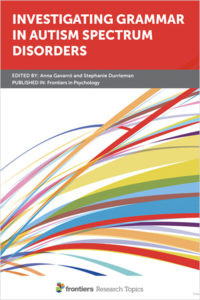10 juny, 2020
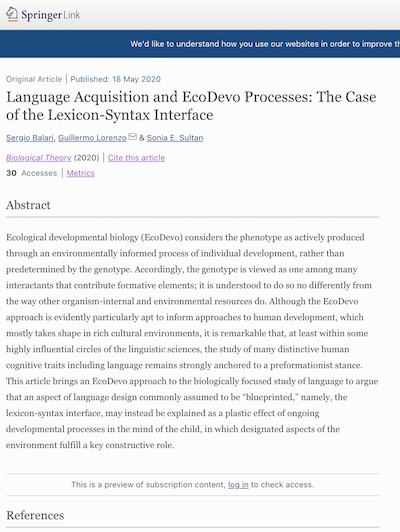
Autors:
Balari, S., Lorenzo, G. & Sultan, S.E.
Títol:
Language Acquisition and EcoDevo Processes: The Case of the Lexicon-Syntax Interface. Biological TheoryEditorial: Springer
Data de publicació: Maig del 2020
Més informació
Text completEcological developmental biology (EcoDevo) considers the phenotype as actively produced through an environmentally informed process of individual development, rather than predetermined by the genotype. Accordingly, the genotype is viewed as one among many interactants that contribute formative elements; it is understood to do so no differently from the way other organism-internal and environmental resources do. Although the EcoDevo approach is evidently particularly apt to inform approaches to human development, which mostly takes shape in rich cultural environments, it is remarkable that, at least within some highly influential circles of the linguistic sciences, the study of many distinctive human cognitive traits including language remains strongly anchored to a preformationist stance. This article brings an EcoDevo approach to the biologically focused study of language to argue that an aspect of language design commonly assumed to be “blueprinted,” namely, the lexicon-syntax interface, may instead be explained as a plastic effect of ongoing developmental processes in the mind of the child, in which designated aspects of the environment fulfill a key constructive role.
10 juny, 2020

Autors:
Panagiota Margaza & Anna Gavarró
Títol:
Null/overt subject alternations in L2 Spanish and L2 GreekEditorial: Glossa: a journal of general linguistics
Data de publicació: Juny de 2020
Text completThis study aims at exploring the omission/expression of subjects in L2 Spanish and L2 Greek. The distribution of subjects is examined in the context of the Interface Hypothesis (IH), which locates the difficulty of acquisition at the syntax-pragmatics interface (Sorace & Filiaci 2006; Tsimpli & Sorace 2006) and the language combination examined is a case in point as both languages share the null subject property and yet the IH predicts delay in L2 acquisition. We also examine the predictions of Lozano’s (2016) Pragmatic Principles Violation Hypothesis. We designed two multiple-choice tasks, one in Spanish and one in Greek, testing subjects in various pragmatic contexts. The tasks were administered to L2 intermediate and advanced learners and native speakers of Spanish and Greek. The results obtained indicate that the L2 learners were able to select the felicitous type of subjects in the appropriate contexts, although they did not always achieve native-like patterns. An asymmetry arose between L2 Greek and L2 Spanish, as L2 Greek was native-like, an asymmetry that failed to be predicted by any of the hypotheses entertained. Even though the involvement of the interface levels might have affected L2 performance, the syntax-pragmatics interface was not consistently having a detrimental effect on the results. Furthermore, our results with the control group indicated that the subject distribution in adult Greek is more nuanced than reported in the literature, especially in unambiguous referent-shift contexts.
17 febrer, 2020
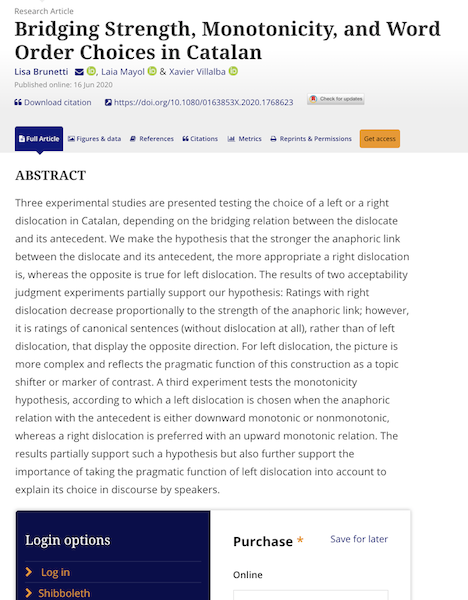
Autors:
Lisa Brunetti, Laia Mayol & Xavier Villalba
Títol:
Bridging Strength, Monotonicity, and Word Order Choices in CatalanEditorial: Discourse Processes
Data de publicació: Juny de 2020
Més informacióThree experimental studies are presented testing the choice of a left or a right dislocation in Catalan, depending on the bridging relation between the dislocate and its antecedent. We make the hypothesis that the stronger the anaphoric link between the dislocate and its antecedent, the more appropriate a right dislocation is, whereas the opposite is true for left dislocation. The results of two acceptability judgment experiments partially support our hypothesis: Ratings with right dislocation decrease proportionally to the strength of the anaphoric link; however, it is ratings of canonical sentences (without dislocation at all), rather than of left dislocation, that display the opposite direction. For left dislocation, the picture is more complex and reflects the pragmatic function of this construction as a topic shifter or marker of contrast. A third experiment tests the monotonicity hypothesis, according to which a left dislocation is chosen when the anaphoric relation with the antecedent is either downward monotonic or nonmonotonic, whereas a right dislocation is preferred with an upward monotonic relation. The results partially support such a hypothesis but also further support the importance of taking the pragmatic function of left dislocation into account to explain its choice in discourse by speakers.
3 febrer, 2018
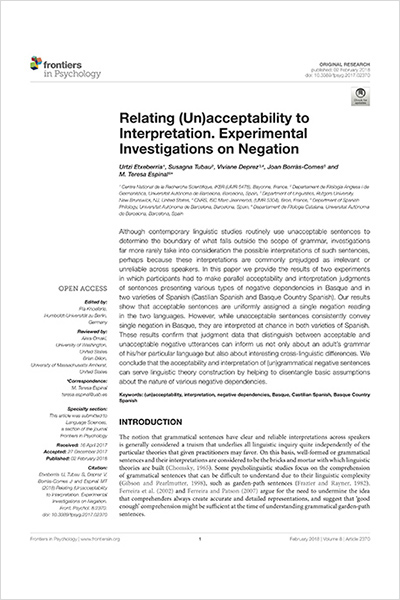
Autors:
Urtzi Etxeberria, Susagna Tubau, Viviane Deprez, Joan Borràs-Comes and M. Teresa Espinal
Títol:
Relating (Un)acceptability to InterpretationEditorial: Frontiers in Psychology
Col·lecció: Frontiers in Psychology #8Data de publicació: 2018
Més informació
Text completAlthough contemporary linguistic studies routinely use unacceptable sentences to determine the boundary of what falls outside the scope of grammar, investigations far more rarely take into consideration the possible interpretations of such sentences, perhaps because these interpretations are commonly prejudged as irrelevant or unreliable across speakers. In this paper we provide the results of two experiments in which participants had to make parallel acceptability and interpretation judgments of sentences presenting various types of negative dependencies in Basque and in two varieties of Spanish (Castilian Spanish and Basque Country Spanish). Our results show that acceptable sentences are uniformly assigned a single negation reading in the two languages. However, while unacceptable sentences consistently convey single negation in Basque, they are interpreted at chance in both varieties of Spanish. These results confirm that judgment data that distinguish between acceptable and unacceptable negative utterances can inform us not only about an adult’s grammar of his/her particular language but also about interesting cross-linguistic differences. We conclude that the acceptability and interpretation of (un)grammatical negative sentences can serve linguistic theory construction by helping to disentangle basic assumptions about the nature of various negative dependencies.
Títols de la col·lecció / Also in this series:
1 setembre, 2020
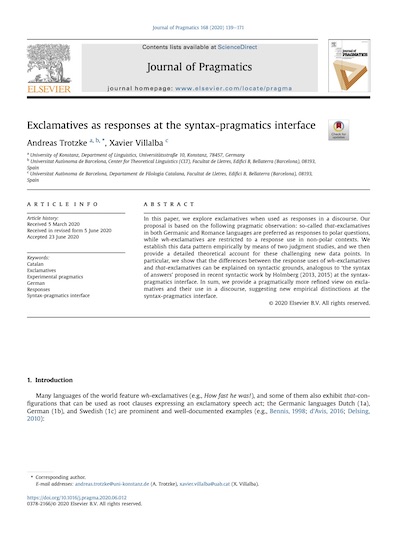
Autors:
Andreas Trotzke & Xavier Villalba
Títol:
Exclamatives as responses at the syntax-pragmatics interfaceEditorial: Journal of Pragmatics, 168 (pp. 139–171)
Data de publicació: Octubre del 2020
Més informació
Text completIn this paper, we explore exclamatives when used as responses in a discourse. Our proposal is based on the following pragmatic observation: so-called that-exclamatives in both Germanic and Romance languages are preferred as responses to polar questions, while wh-exclamatives are restricted to a response use in non-polar contexts. We establish this data pattern empirically by means of two judgment studies, and we then provide a detailed theoretical account for these challenging new data points. In particular, we show that the differences between the response uses of wh-exclamatives and that-exclamatives can be explained on syntactic grounds, analogous to ‘the syntax of answers’ proposed in recent syntactic work by Holmberg (2013, 2015) at the syntax-pragmatics interface. In sum, we provide a pragmatically more refined view on exclamatives and their use in a discourse, suggesting new empirical distinctions at the syntax-pragmatics interface.





